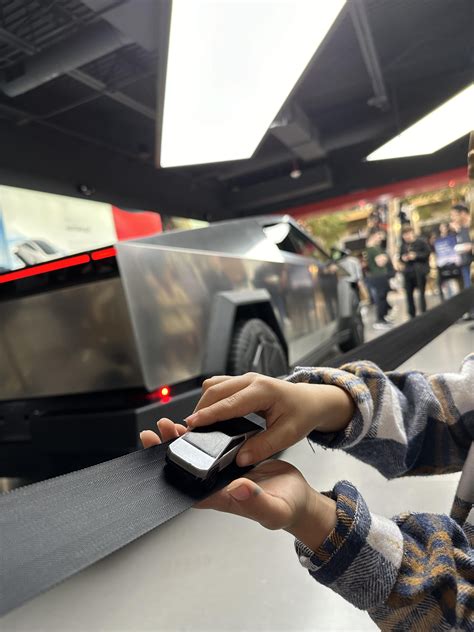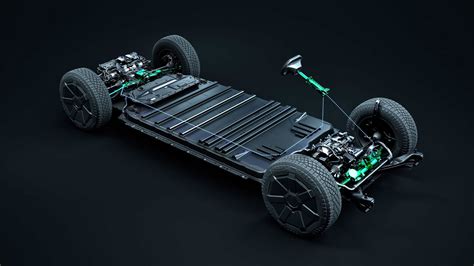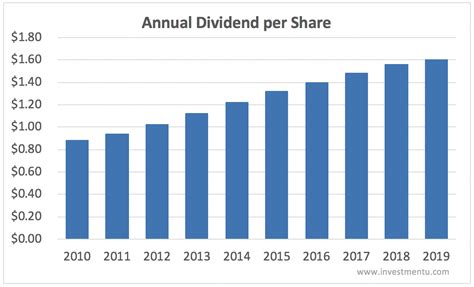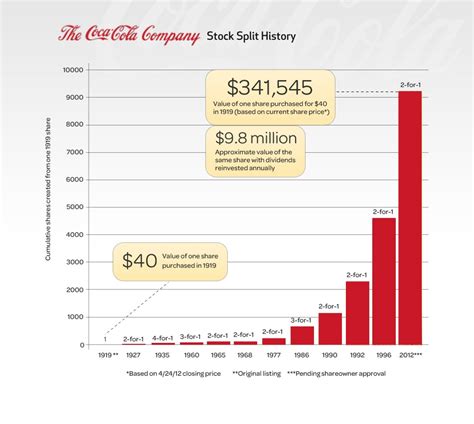
A Chinese electric vehicle startup, Stellaris, has unveiled its Pioneer EV, a pickup truck boasting steer-by-wire technology and a price tag of approximately $41,000, directly challenging Tesla’s Cybertruck in both features and affordability within the Chinese market.
Forget Tesla’s Cybertruck; China’s Stellaris is entering the electric pickup arena with the Pioneer EV, a vehicle sporting advanced features and a competitive price point aimed at disrupting the market. The Pioneer EV distinguishes itself with steer-by-wire technology and a more accessible price compared to Tesla’s offering, potentially appealing to a broader consumer base in China. While Tesla grapples with production challenges and pricing strategies for the Cybertruck, Stellaris aims to capitalize on the growing demand for electric pickups with a technologically advanced and economically viable alternative.
The Pioneer EV’s steer-by-wire system is a key differentiator, eliminating the mechanical connection between the steering wheel and the wheels. This technology promises enhanced responsiveness, improved maneuverability, and customizable steering ratios, offering a more refined driving experience. While full details on the system are still emerging, the integration of steer-by-wire positions the Pioneer EV as a frontrunner in adopting advanced automotive technology within the Chinese electric vehicle market.
Beyond the steer-by-wire system, the Pioneer EV boasts a sleek and modern design, aligning with contemporary electric vehicle aesthetics. The vehicle’s dimensions and payload capacity are expected to cater to both urban and rural consumers, making it a versatile option for various applications. Stellaris has yet to release comprehensive specifications, but the initial details suggest a competitive range and performance figures, positioning the Pioneer EV as a formidable contender in the electric pickup segment.
The $41,000 price point is particularly noteworthy, as it significantly undercuts the expected price range of the Tesla Cybertruck in China. This affordability advantage, coupled with the advanced steer-by-wire technology, could sway potential buyers towards the Pioneer EV, especially those seeking a technologically advanced and budget-friendly electric pickup option.
Stellaris is a relatively new player in the electric vehicle market, but its strategic focus on innovative technology and competitive pricing could enable it to carve out a significant market share. The company’s ability to scale production, establish a robust service network, and effectively market the Pioneer EV will be crucial factors in its long-term success. The Chinese electric vehicle market is highly competitive, with numerous domestic and international players vying for dominance. Stellaris faces challenges from established automakers and emerging startups alike, requiring a comprehensive and well-executed business strategy to thrive.
The launch of the Pioneer EV highlights the increasing sophistication of Chinese electric vehicle manufacturers. These companies are no longer simply replicating existing designs but are actively innovating and developing cutting-edge technologies to compete on a global scale. The Pioneer EV’s steer-by-wire system and competitive pricing demonstrate this growing technological prowess and strategic ambition.
Expanded Context and Analysis:
The electric vehicle (EV) market is experiencing exponential growth globally, and China is at the forefront of this revolution. The Chinese government’s strong support for EVs, coupled with increasing consumer demand and technological advancements, has created a fertile ground for both established automakers and emerging startups.
Tesla’s entry into the Chinese market has been a catalyst for innovation and competition. The Cybertruck, with its unconventional design and advanced features, has generated significant buzz and anticipation. However, Tesla’s production challenges and pricing uncertainties have created an opportunity for domestic players like Stellaris to step in with compelling alternatives.
The steer-by-wire technology featured in the Pioneer EV represents a significant advancement in automotive engineering. Traditional steering systems rely on a mechanical linkage between the steering wheel and the wheels, transmitting the driver’s input through a series of gears and linkages. Steer-by-wire systems replace this mechanical connection with electronic sensors and actuators, allowing for greater control, customization, and safety features.
Benefits of Steer-by-Wire:
- Enhanced Responsiveness: Steer-by-wire systems can react more quickly to driver inputs, providing a more precise and responsive steering feel.
- Improved Maneuverability: The system can adjust the steering ratio based on vehicle speed and driving conditions, making it easier to maneuver in tight spaces and at high speeds.
- Customizable Steering Ratios: Drivers can personalize the steering sensitivity to their preferences, allowing for a more comfortable and engaging driving experience.
- Advanced Safety Features: Steer-by-wire systems can be integrated with advanced driver-assistance systems (ADAS) to provide features such as lane keeping assist and automatic emergency steering.
- Reduced Weight and Complexity: By eliminating the mechanical linkage, steer-by-wire systems can reduce vehicle weight and complexity, potentially improving fuel efficiency and reliability.
While steer-by-wire technology offers numerous advantages, it also raises concerns about safety and reliability. The system relies on electronic components and software, which are susceptible to failure. To address these concerns, manufacturers are implementing redundant systems and rigorous testing procedures to ensure the safety and reliability of steer-by-wire technology.
Challenges for Stellaris:
Despite the promising features and competitive pricing of the Pioneer EV, Stellaris faces several challenges in the highly competitive Chinese electric vehicle market.
- Brand Recognition: Stellaris is a relatively unknown brand, and it needs to build brand awareness and establish trust among consumers.
- Production Capacity: Scaling up production to meet demand is a major challenge for any new automaker, and Stellaris needs to ensure that it has the manufacturing capacity to deliver the Pioneer EV to customers in a timely manner.
- Service Network: Establishing a comprehensive service network is crucial for providing after-sales support and maintaining customer satisfaction.
- Competition: The Chinese electric vehicle market is crowded with established automakers and emerging startups, and Stellaris needs to differentiate itself from the competition and offer a compelling value proposition.
- Regulatory Environment: The Chinese government’s policies and regulations can significantly impact the electric vehicle market, and Stellaris needs to stay abreast of these changes and adapt its business strategy accordingly.
- Supply Chain: Securing a reliable supply of batteries and other critical components is essential for ensuring consistent production and avoiding delays.
- Technological Advancement: The electric vehicle industry is rapidly evolving, and Stellaris needs to continue to innovate and develop new technologies to stay ahead of the competition.
- Marketing and Sales: Effectively marketing the Pioneer EV and establishing a robust sales network are crucial for reaching potential customers and driving sales.
Impact on Tesla:
The launch of the Pioneer EV poses a direct challenge to Tesla in the Chinese market. Tesla’s Cybertruck has generated significant interest, but its high price and production delays have created an opening for competitors like Stellaris to offer more affordable and readily available alternatives.
The Pioneer EV’s steer-by-wire technology also puts pressure on Tesla to innovate and incorporate similar advanced features into its vehicles. Tesla has a reputation for technological leadership, and it needs to maintain that edge by continuously developing and implementing cutting-edge technologies.
The Chinese electric vehicle market is a critical battleground for global automakers, and the competition between Tesla and domestic players like Stellaris is likely to intensify in the coming years. The success of each company will depend on its ability to innovate, scale production, establish strong brands, and navigate the complex regulatory landscape.
The Broader Implications:
The emergence of Chinese electric vehicle manufacturers like Stellaris has broader implications for the global automotive industry. These companies are not only competing in the Chinese market but are also increasingly looking to expand into international markets.
The Pioneer EV’s steer-by-wire technology and competitive pricing demonstrate the growing technological capabilities and strategic ambition of Chinese automakers. These companies are poised to become major players in the global electric vehicle market, challenging the dominance of established automakers from the United States, Europe, and Japan.
The rise of Chinese electric vehicle manufacturers could lead to a more competitive and innovative global automotive industry, benefiting consumers with more affordable and technologically advanced vehicles. However, it also poses challenges for established automakers, who need to adapt to the changing competitive landscape and develop new strategies to maintain their market share.
The Chinese government’s support for electric vehicles is also having a significant impact on the global automotive industry. China’s policies and regulations are encouraging the development and adoption of electric vehicles, creating a large and rapidly growing market for electric vehicle manufacturers.
The Chinese government’s focus on electric vehicles is driven by several factors, including concerns about air pollution, energy security, and economic competitiveness. The government sees electric vehicles as a way to reduce air pollution in major cities, reduce reliance on imported oil, and promote the growth of a new industry.
The Chinese government’s policies and regulations have created a favorable environment for electric vehicle manufacturers, attracting investment and driving innovation. This has led to the emergence of a vibrant electric vehicle ecosystem in China, with numerous companies developing and manufacturing electric vehicles, batteries, and other related technologies.
The Chinese electric vehicle market is expected to continue to grow rapidly in the coming years, driven by government support, increasing consumer demand, and technological advancements. This growth will create opportunities for both domestic and international electric vehicle manufacturers, but also intensify competition and require companies to continuously innovate and adapt.
Conclusion:
The Stellaris Pioneer EV represents a significant development in the Chinese electric vehicle market, demonstrating the growing technological capabilities and strategic ambition of domestic automakers. The Pioneer EV’s steer-by-wire technology and competitive pricing pose a direct challenge to Tesla and other established automakers, highlighting the increasing competition in the global electric vehicle market. The success of Stellaris and other Chinese electric vehicle manufacturers will depend on their ability to innovate, scale production, establish strong brands, and navigate the complex regulatory landscape. The rise of Chinese electric vehicle manufacturers is likely to have a significant impact on the global automotive industry, leading to a more competitive and innovative market, benefiting consumers with more affordable and technologically advanced vehicles. The launch of the Pioneer EV underscores China’s ambition to lead the global electric vehicle revolution, challenging the status quo and driving innovation in the automotive industry.
Frequently Asked Questions (FAQ):
1. What is the Stellaris Pioneer EV, and why is it significant?
The Stellaris Pioneer EV is an electric pickup truck manufactured by Chinese EV startup Stellaris. Its significance lies in its advanced features, notably the steer-by-wire technology, and its competitive price of around $41,000. This combination directly challenges Tesla’s Cybertruck, offering a potentially more affordable and technologically advanced alternative in the Chinese market. “The Pioneer EV distinguishes itself with steer-by-wire technology and a more accessible price compared to Tesla’s offering, potentially appealing to a broader consumer base in China.”
2. What is steer-by-wire technology, and what are its benefits?
Steer-by-wire is an advanced steering system that replaces the traditional mechanical linkage between the steering wheel and the wheels with electronic sensors and actuators. This offers several benefits, including enhanced responsiveness, improved maneuverability, customizable steering ratios, advanced safety features, and potentially reduced weight and complexity. “Steer-by-wire systems can react more quickly to driver inputs, providing a more precise and responsive steering feel…drivers can personalize the steering sensitivity to their preferences.”
3. How does the price of the Stellaris Pioneer EV compare to the Tesla Cybertruck?
The Stellaris Pioneer EV is priced at approximately $41,000, which is significantly lower than the expected price range of the Tesla Cybertruck in China. This affordability advantage is a key factor that could attract potential buyers. “The $41,000 price point is particularly noteworthy, as it significantly undercuts the expected price range of the Tesla Cybertruck in China.”
4. What are the main challenges facing Stellaris as a new EV manufacturer?
Stellaris faces several challenges, including building brand recognition, scaling up production, establishing a comprehensive service network, competing with established automakers and other startups, navigating the regulatory environment, securing a reliable supply chain, keeping up with technological advancements, and effectively marketing and selling the Pioneer EV. “Stellaris is a relatively unknown brand, and it needs to build brand awareness and establish trust among consumers…scaling up production to meet demand is a major challenge for any new automaker.”
5. What impact could the Pioneer EV have on Tesla and the broader EV market?
The Pioneer EV poses a direct challenge to Tesla in the Chinese market, potentially impacting its sales and market share. It also puts pressure on Tesla to innovate and incorporate similar advanced features into its vehicles. More broadly, the Pioneer EV demonstrates the increasing sophistication of Chinese EV manufacturers, which are becoming major players in the global EV market. “The Pioneer EV’s steer-by-wire technology also puts pressure on Tesla to innovate and incorporate similar advanced features into its vehicles…These companies are poised to become major players in the global electric vehicle market.”









